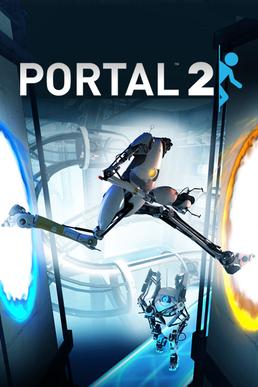 |
|
|
Personal Completion Time: |
9 hours |
 |
|
|
Personal Completion Time: |
9 hours |
Portal 2 is the sequel to Valve’s hit puzzle-adventure game Portal. The game takes place some time after the events of the first game, and so it is able to add onto the story quite a lot. The first game wasn’t all too story-focused, focusing far more on gameplay. While I think both games are phenomenal in their own rights, I do admittedly believe I enjoyed the first game over this one. In 2024, I re-discovered how much of a sucker I am for puzzle games, and the Portal games are no exception. I played the first game back in July 2024, and played the second one in late December of the same year. Portal 2, specifically, is really hard for me to explain how I feel about it. Yes, it’s very well-received universally, and understandably so, but there’s something I struggle to put my finger on that makes me turn my eyes towards the first game.
Maybe it’s the environment and puzzles. In the entirety of Portal 1, you’re in the Aperture Science Test Chambers, but in the second game, you’re only there maybe two thirds of the time? There’s a lot of time where you’re still doing puzzles and whatnot, but you’re outside? And as much as it makes sense for the sake of plot relevance, I wasn’t a big fan of doing these outside puzzles. Generally, especially in the second half of the game, I felt as if many of the puzzles were more frustrating than anything else. I don’t recall being that frustrated at any point in the first game, and if I was then it had to have been so mild to where of course I forgot. Portal 2 has a ton of new mechanics used in the puzzles, and I don’t particularly dislike any of them, but the execution of them can be a bit unpredictable way too quickly. I feel like I’m being forced to master these techniques before I can get past the learning stage, figuratively.
Other than the frustration, I wouldn’t say any of the puzzles are particularly bad. At worst, they’re either confusing, forgettable, or mediocre. On the contrary, this only speaks for a relatively small percentage, and only really in the second half of the game. Now, I should probably talk about the plot, which is something this game focuses more on than it did in the first game. I think the plot is actually pretty well-written, albeit not what I particularly came to the game for. Adding a plot to a puzzle game like this is always a nice treat though, especially a good one. In the first half of the game, I did often have a hunch that there were some things that Wheatly wasn’t telling the player character, since he did seem pretty odd. I hadn’t expected to team up with a potato- I mean, GLaDOS, who was essentially the first game’s main antagonist, and even in the first half of Portal 2. But it does make sense, and I feel like both the player/test subject and GLaDOS herself got a happy, albeit compromised (on GLaDOS’ side) ending.
The game was also a bit unsettling at times, especially in the aforementioned outside parts, likely as a result of how the fame seems to be post-apocalyptic, where there are seemingly no humans in sight, and everything looks run-down and dystopian. But it works well, and for 2011, the game is quite graphically pleasing. Originally I gave the game an 8.5/10, but I decided I should bump it up to a 9/10. The only issue I had was the aforementioned frustration, but everything else drastically outweighs it, giving it a high score in my book… or site, I guess.